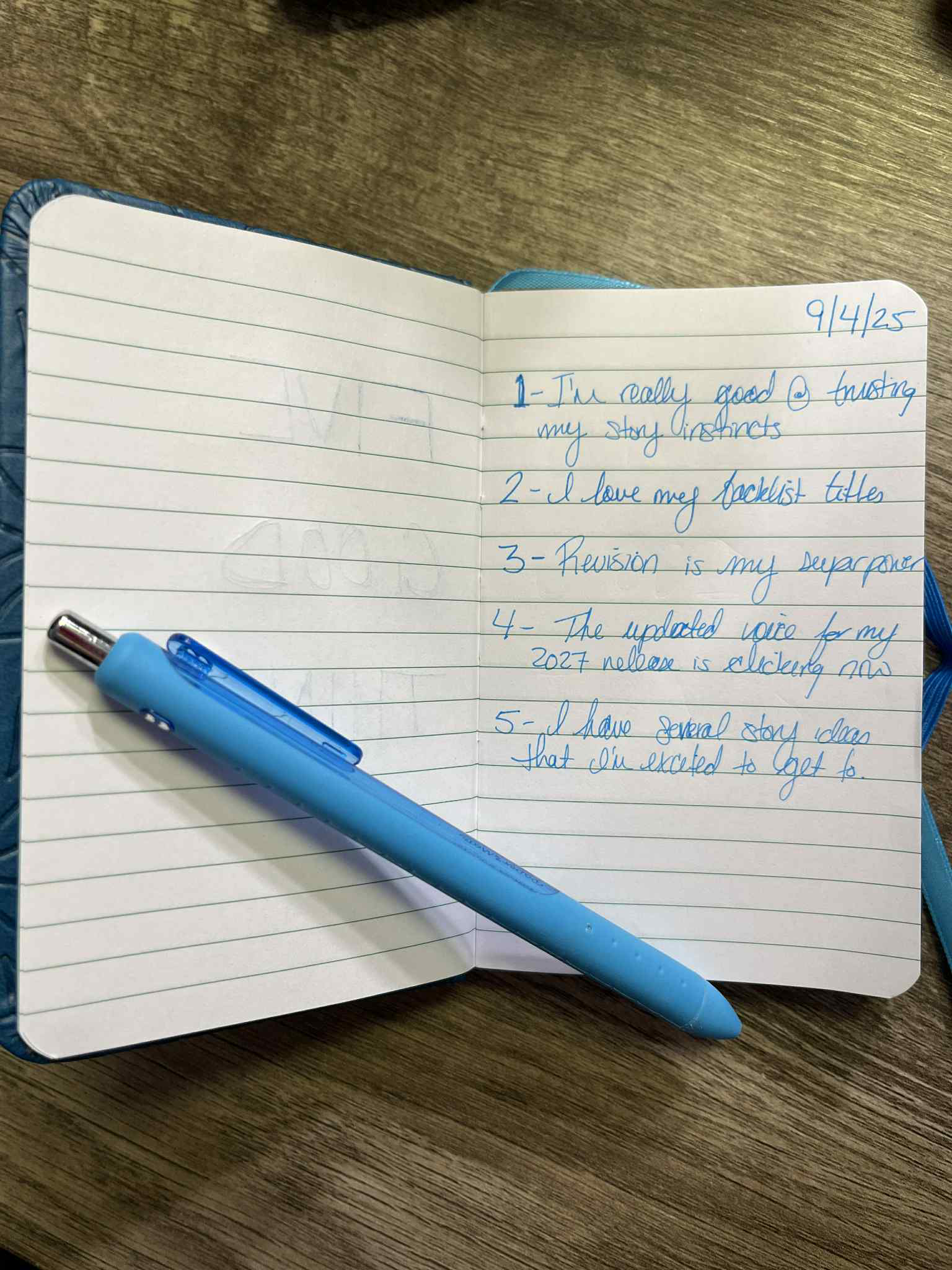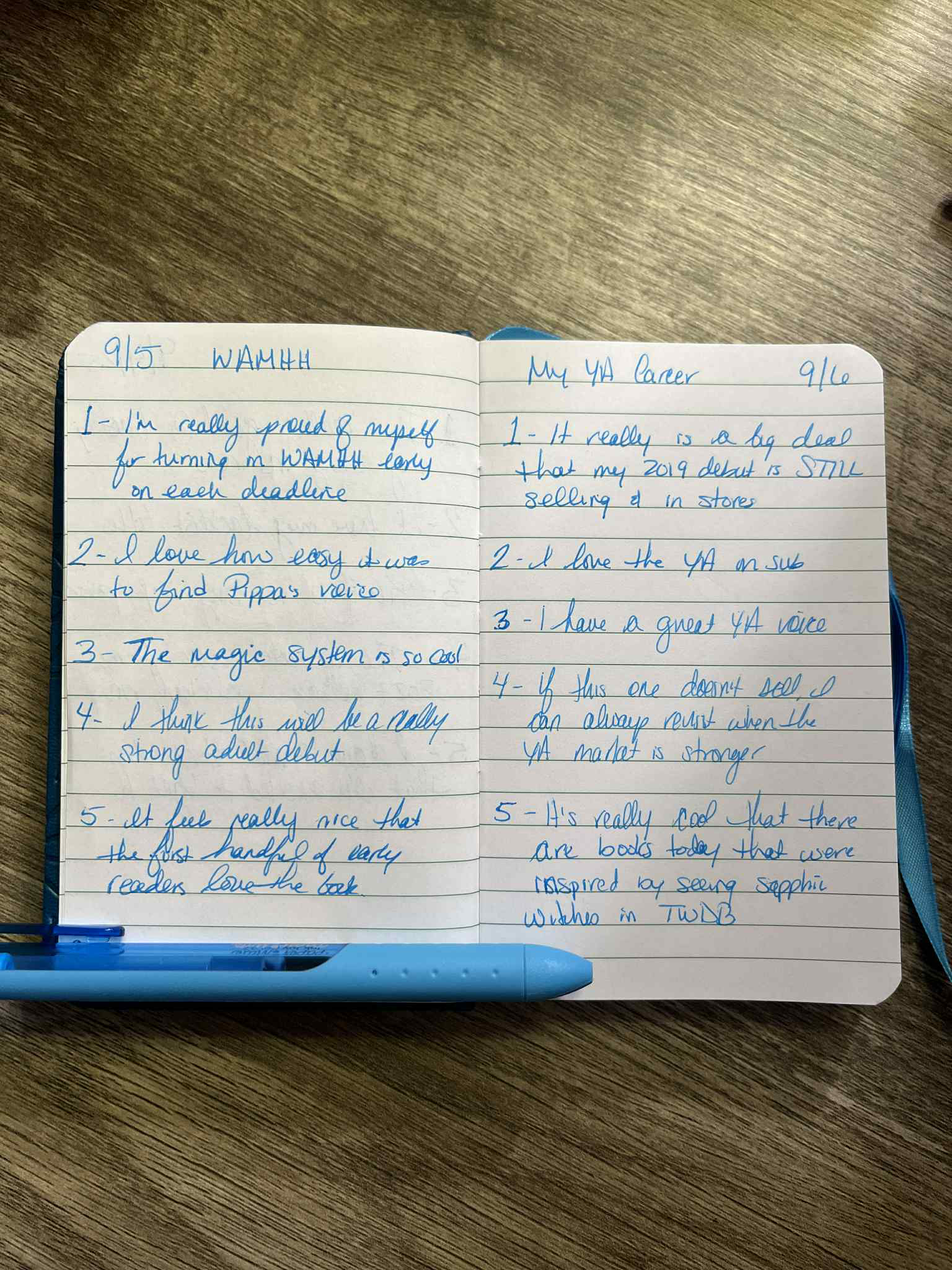September Challenge: 30 Days to Better Confidence
Sep 08, 2025*Reminder: Real Talk for Writers is on a biweekly schedule going forward. If you want more support for your author career, be sure to check out The Author Burnout Cure Podcast, which will continue to post weekly.*
***
Confidence is one of the key "soft skills" for a successful (enjoyable!) author career.
Confidence is what allows you to write without constantly second-guessing every choice. It helps you ask your agent questions without worrying that you'll annoy them. Confidence helps you emotionally navigate those moments where you run into shitty reviews. It helps your weather rejections without falling down the rabbit hole of "I'll never sell anything again!"
Because I believe confidence is so important -- my coaching program is called The Confident Author Academy for a reason! -- I'm sharing the 30-day confidence challenge that I'm doing alongside my clients this month.
If you'd like to listen to me talk more about this challenge (including how the repetition built into the process is so effective for changing your confidence level), you can check out episode 182 of my podcast by clicking here.
Let's dive into the challenge instructions.
Step 1: Rate Your Current Confidence Level
Before you embark on this 30-day challenge, it's important to assess your starting point. When change is gradual, it's easy to feel like nothing is changing. By including a snapshot of where you're getting started, it'll be easier to see how you've changed.
If you've ever lived with a small child (either your own, a much younger sibling, or another situation), you've probably experienced this before. When you see someone every day, even when they're growing rapidly, it can be hard to notice the difference until you l look at old pictures. Being able to look back at what they looked like a month ago highlights how much bigger they are now.
The rating process is simple -- when I did this for myself, it took less than 2 minutes.
So grab a piece of paper, sticky note, journal, or your notes app and rate your current level of confidence on a scale of 1-10 (where 1 means "I constantly second-guess myself and worry all the time that my career is going to implode" and 10 means "I trust my writing process and believe that my career will last for however long I want it to").
You can do one number to encompass the entirety of your career or you can split it up into a couple of different categories. Don't go wild with different categories though!
Here are some example categories -- How confident are you in your:
- Storytelling instincts
- Writing quality
- Continued/future success of your career
- Current publishing relationships
Once you've rated yourself, put these numbers somewhere you won't necessarily see them every day but will also be easy to find at the end of the 30 days. You'll ALSO want to jot down the categories you chose (without the numbers) and save that to fill out at the end of the 30 days so you can rate the same categories then.
Step 2: Commit to 30 Days of Confidence Journaling
Don't let the word "journaling" overwhelm or discourage you. This will only take 2-5 minutes a day, I promise.
For the next 30 days, I want you to write down five good things about your writing, your books, your author career, your readers, etc. You can also think of this in terms of "things I'm good at" or "things I'm proud of." The point is to push your brain to search for positive things about your career to provide balance against the habitual negative thoughts that already come easily to you.
You can mix and match those categories within a single day's list or you can pick a theme for the day. Whatever makes it easier for your brain to produce a list of five good things.
You can also be as general (I'm really good at revision) or as specific (the climax scene in The Coldest Touch came out exactly how I wanted it to) as you want.
Here are a few examples from my first week of doing this process (I started on September 4th alongside my current group coaching clients):



Each of those entries only took about 2 minutes. I also intentionally used a very small journal so I wouldn't be tempted to try to fill a whole big page. As you can see in the first photo, the journal itself is shorter than my pen!
As you do this process, don't let yourself get trapped in perfectionism. Yes, the consistency of doing this regularly is important for changing the way you think, but if you miss a day, just pick it back up as soon as you remember to (more on how to avoid perfectionism in the "tips" section below).
Step 3: Rate Your Confidence Again on Day 31
After you've (imperfectly but consistently) completed your 30 days, pull out the note where you kept your list of categories (you already wrote that, right?) and--without checking your initial scores!--rate your confidence again.
Hint: if you're worried that you'll forget or lose the categories you chose, write them on a sticky note and put it on your computer. Or, if you're using a notebook, count forward 31 pages from your initial rating and put the categories there.
Once you've decided your new ratings, you can go back to your initial rating and see if any of the numbers have shifted.
As a bonus, you can jot down a few notes about what feels different about your career. Do you second-guess yourself less during writing sessions? Is it a little easier to speak up to your publisher when you have questions or concerns?
Note: if something bad happens in your career toward the end of the 30 days, you may not notice a huge change. That's okay! Consider how your reaction to the hard thing might have been different if you hadn't spent a month practicing these more confident thoughts.
Finally, make sure you give yourself a few minutes to celebrate yourself for showing up for this process! It's easy to think something small like this isn't good enough, but it's these small efforts -- done consistently -- that produce the biggest changes.
I'd also love to know how the challenge went for you! Consider putting a note in your calendar for the end of the challenge to send me an email and let me know how it went!
Tips for a Successful Challenge
Here are a few tips to help you as you embark on the 30 day challenge:
1 - Build this process into your schedule so you don't forget to do it
The daily journaling only takes 2-5 minutes. It's easy to do . . . and also easy to skip.
Consider what might help you remember to do this on a regular basis. Perhaps this goes into your calendar at a set time -- or you have an alarm in your phone to help you remember to do it.
Or, you can habit stack this with something else you do. Some ideas include:
- Journaling first thing when you sit down to write
- Jotting down your 5 things in your notes app after you brush your teeth
- Writing them while cozied up with your morning beverage
- Making your list during your lunch break at work
2 - Don't let perfectionism get in your way
You do not have to do this perfectly to experience the benefit. Consistency is better than perfection.
If you feel like shit one day and your brain is being a real asshole, just write down ONE good thing rather than skipping a day.
Did you forget a day or two? No worries. Just pick it up as soon as you remember. Don't start over. Don't try to do 10-15 good things in an effort to "catch up." Just keep going. That is what it means to be consistent rather than perfect. The point is to increase your confidence, not do the challenge exactly right.
Focusing on consistency (rather than perfection) is important for 2 reasons.
First, if you do your confidence journaling on 20 semi-sporadic days over a 30 day challenge, that's so much better than accidentally skipping day 8 and then giving up entirely because you "messed up your streak."
Secondly, if perfectionism regularly slows down your writing process, this is a great, low-pressure way to practice letting that go of that perfectionism. The more you practice in lower pressure ways, the easier it will be to apply to your actual writing process.
3 - Don't be precious about this
While, sure, it can be nice to have all your journal entries in once place, it’s more important that you DO this process rather than doing it prettily.
If some days you write your list on a sticky note, others in your phone, and sometimes it goes in one of three different physical journals, that’s FINE. The important thing here is that you're continually asking your brain to find these positive beliefs.
4 - Make sure to WRITE your list each day
Do not let yourself get away with simply thinking your five things.
The human brain is designed to conserve energy, so when we ask it to just "think" something, it can get really lazy. When you have to write something down, your brain has to articulate the thought in a deeper way, which is ultimately more effective in changing your thought process.
Again, this doesn't have to be precious. You can type your list into your phone, put it in a google doc, or jot it on a scrap of paper that you immediately lose. It's just about putting it down somewhere tangibly in order to build those neural pathways in your brain.
5 - You're Allowed to Repeat Yourself
You can absolutely repeat yourself throughout the 30 days! In fact, repetition is great as part of this process.
That said, I still want you pulling your list from inside your own brain rather than looking at previous lists to find more ideas. It's the act of making your brain search for something positive that builds your confidence muscle.
Final Thoughts
I'd love to know if you decide to take on this 30-day challenge. Don't let the simplicity or the low daily effort fool you. The compounding effect of regularly finding things you love about your writing life and your author career is incredibly powerful.
Send me an email and let me know how the challenge goes! I'd love to cheer you on.
Happy writing,
Isabel
PS - I have 4 spaces for new private clients opening later this fall. Get on the waitlist to be the first to know when spaces are available.
PPS - Don't miss a single issue of Real Talk for Writers. CLICK HERE to sign up for the Real Talk newsletter. You'll receive an email every other Monday morning with the newest issue plus notifications about upcoming workshops.

